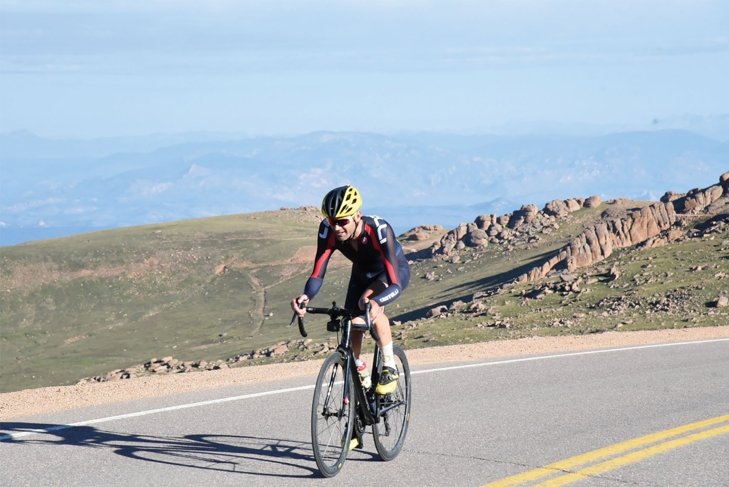
Here’s how one athlete is moving on from professional cycling (sort of).
When I started my first bike race at 19 years old, I loved the combination of strength and tactics. Bike racing was the first thing I was good at immediately. So despite drug scandals in the sport, fleeing sponsors and a late start (most pros are already competing at age 13), I dedicated my next decade to tight pants and skinny tires. Over the years, I climbed the ladder up the low-budget American leagues, aiming at the Tour de France.
When the dream is over
In 2014, I joined a top team, racing in Europe at the highest level. In 2016, the team didn’t renew my contract. Rather than go back to the United States to finish my career, I decided that the dream was dead, and it was better to accept that and move on. This is going to sound pathetic—after all, any athlete knows the end is coming, and ultimately it was my decision—but I was surprised at how devastating and heartbreaking it was to retire from pro cycling. I was 30 years old and utterly defeated.
It’s been almost a year since I announced my “retirement.” After a lot of work, I’m starting to be able to feel proud about my career and overcome the feeling of failure that’s probably natural for anyone at the end of his prime. I had a lot of luck in how this past year has worked out. But I think my process could apply to anyone who takes pride in their health, yet sees their fitness slowing down due to changing priorities, aging or other external forces.
How I moved on
First, thanks to Penguin Publishing Group, I wrote a book about it. Draft Animals: Living the Pro Cycling Dream (Once in a While) comes out on October 10, 2017. Obviously, writing a book isn’t for everybody, but journaling is great catharsis. Telling your story might help you understand it for the first time—even if your audience is imaginary.
Next, I itemized the different boxes in my life that bike racing checked, with the goal of replacing them, one by one.
The competitive/athletic box
There are lots of small races that I could jump into as an amateur, but I decided that wouldn’t be healthy. Instead, I do group rides called gran fondos, which are competitive-ish (but safe). I also discovered Strava, a social media app that uses GPS to track times on segments—specific sections of trails or roads—all over the world. With Strava, I’m able to “compete” with pros on some of the toughest climbing segments in the country, on my own schedule.
I’ll have to let the competitive part go eventually, but I’ll always see my body as a project. The ultimate goal is to be my best self without competition, but for now, this is good methadone.
The financial box
My book advance bought me some time, so I was able to wait for the right opportunity to pop up. My Strava quest targeted doper records at first, which the cycling media enjoyed—so in a surprise twist, I was able to round up sponsors for a YouTube show called Worst Retirement Ever, where I chase hill-climb records and Strava segments on camera.
The joke is that I’m so bad at retirement, I’m still training and suffering up mountains. Worst Retirement Ever is part travel show, part bike ride, and I can choose my own sponsors. I have nicer equipment now than I did when I was actually racing.
The social box
If you live in the traveling circus of bike racing, everyone you know is a professional cyclist. There are many pros that I’ll be close to for the rest of my life, but I’ve been making an effort to say yes to invitations from local friends. At first, it was weird to be out past 9 pm—there’s a whole new world out there. I’ve gone to comedy clubs, gone on dates and a couple of times, had more than two drinks! Crazy, right?
To give back to the cycling community, I put on an annual charity bike ride called Phil’s Cookie Fondo in Malibu. I design courses from 25 to 115 miles on my favorite training routes, set up aid stops filled with cookies and invite anyone to sign up. We benefit a charity called Chefs Cycle that raises money for No Kid Hungry, so celebrity chefs provide gourmet cookies and meals before and after the ride, making for a glorious Los Angeles experience.
What the future holds
I’ll get a job in sports marketing eventually, so I’m learning as much as I can—getting experience in branded content, sponsorship and the evolving event and media landscape. But for now, my fondo, YouTube show and book all help build on each other, and I’m having a blast.
I had to retire to pull it off, but for the first time, I’m doing everything I want and nothing I don’t. That’s a tremendous gift, and one of my biggest losses has become the best thing that’s ever happened to me.
Tip: Write on
Putting pen to paper (or fingers to keyboard) has legit health benefits. Research shows that expressive writing—which focuses on your thoughts and feelings—can boost working memory, improve social skills and help relieve anxiety and depression.
Writing regularly can also bolster your physical well-being. Studies suggest that by helping to reduce stress, journaling might help you sleep better and even strengthen your immune system.
PHOTO BY Castelli Cycling
